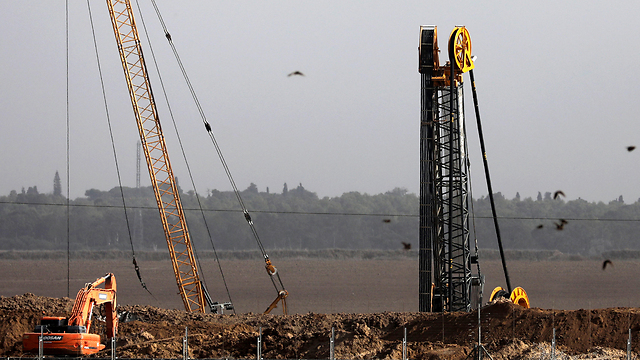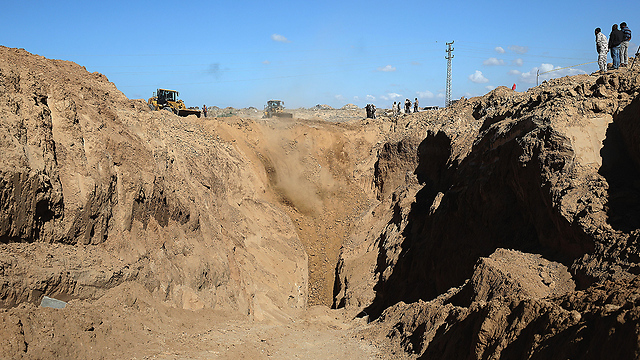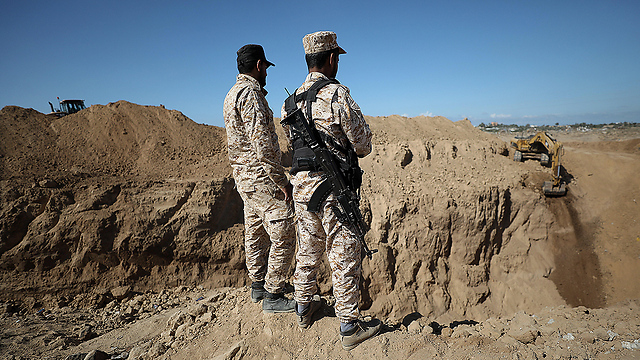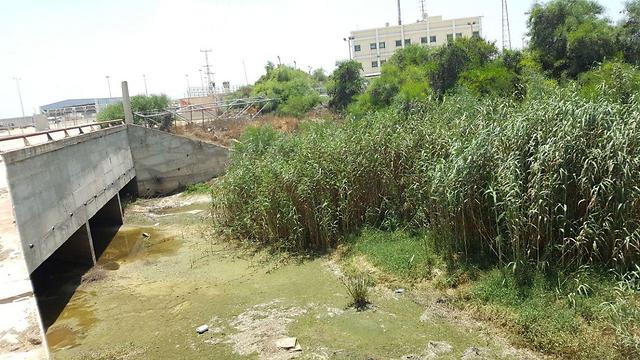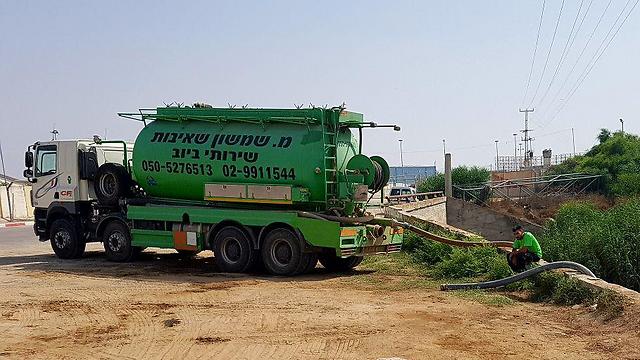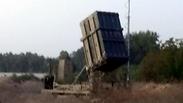
Alertness to preparation: Israel's response to Palestinian threats
Defense establishment undertakes precautions in light of Palestinian retaliatory threats following tunnel explosion; Iron Dome batteries rolled out in southern, central Israel; works on underground barrier near Gaza border start again cautiously; Israeli-Palestinian collaboration on water, environmental issues agreed upon by both parties.
The security establishment is undergoing preparations for a possible escalation in the Gaza Strip following threats by Palestinian Islamic Jihad (PIJ) made in the wake of the IDF exploding a terror tunnel late last month, which claimed the lives of 14 PIJ and Hamas terrorists. Such preparations include heightened defensive activities and rolling out Iron Dome batteries in the central and southern regions of Israel.
While alertness was raised and preparations are underway, work continues on the underground barrier against tunnel near the border, albeit in a somewhat diminished capacity. Work has thus far been carried out in accordance with changing status evaluations, which means work crews can only enter the construction area accompanied by the army. Crews are also obligated to take extreme precautions for fear of sniper or antitank fire.
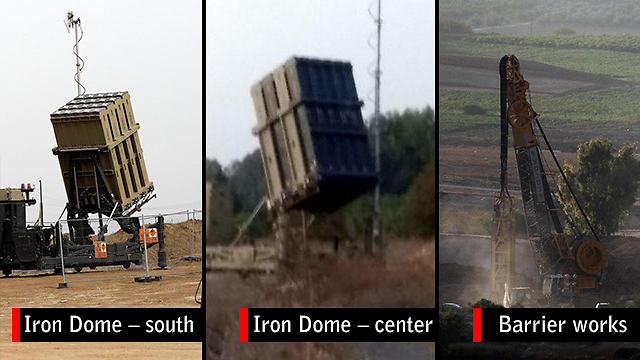
Work has resumed, then, subject to status evaluations held at Southern Command once every few hours. Israeli farmers residing on the Gaza perimeter have also resumed regular agricultural work in the fields near the border fence, but have been asked to arrive to these potentially dangerous areas only according to necessity.
In a somewhat irregular move, the security establishment published a warning message to Hamas over the weekend. "We are aware of the Palestinian Islamic Jihad's plot that is being formed against Israel. It is playing with fire. We will respond with force against Hamas as well," said Coordinator of Government Activities in the Territories Maj.-Gen. Yoav Mordechai.
"It should be clear: Any response by Islamic Jihad, whatever it may be, will be responded to by Israel with power and determination, not only against Islamic Jihad but also against Hamas. We advise the Islamic Jihad leadership in Damascus—Ramadan Shalah and Ziad Nakhaleh—get your hands around this quickly because you are the ones who will be held responsible," Mordechai continued.
PIJ commented Sunday on the veiled threat by Israel towards the organization's leadership. "We will not weaken the leadership of our people and of our land. The threat by the enemy to harm the leadership is on the border of a declaration of war and we will deal with them," PIJ said in its statement.
"These threats show the real intentions of the Zionists. We have a right to respond to any aggression and, therefore, have a right to respond to criminal aggressions against the resistance tunnels that caused the death of 12 fighters from the military wing of Hamas and the (Islamic) Jihad," the statement read before issuing a stern warning.
"Our message to Israel: Your hands, drenched in the blood of our children, will not stop killing until they are cut off or expelled from our land and country. The enemy's terror and threats do not frighten us and will not deter our leadership from the path of Jihad—the principle of our defense and resistance," PIJ concluded its warning to Israel.
Hamas speaker Fawzi Barhoum also commented on Mordechai's message Sunday. "The threats against resistance by the so-called 'Coordinator of the Israeli Government's Activities' Yoav Mordechai reflect the state of panic and confusion the Zionist entity is in at our potential response to the crimes against people of the Palestinian resistance," the spokesperson said.
"The courageous resistance will always continue to be ready to carry out its duty—to defend our nation and break the prestige of the occupation," Barhoum concluded.
The terror tunnel exploded by the IDF last month reached into Israeli land, near Kissufim. Among those killed were PIJ military wing's head of the central Gaza division Arafat Abu Marshould and his deputy Hassan Abu Hasnin. Also killed was a Hamas field commander affiliated with the terror group's elite Nukhba commando unit, who died during rescue operations inside the tunnel.
While PIJ never took official responsibility for excavating the tunnel, it threatened it was "examining the possibilities to retaliate against Israeli escalation and belligerence."
PIJ also hinted in a statement its men were planning to utilize the tunnel to kidnap Israelis. "The freedom tunnel assailed by the enemy was intended to free our prisoners. The movement will have another tunnel to achieve that goal," said PIJ's senior official in Gaza Khaled al-Batash.
Several days after the tunnel was exploded the IDF confirmed it was in possession of the bodies of five PIJ terrorists who were killed in the tunnel.
A wastewater collaborative effort
Despite rising tensions in the south, Israel seems to be strengthening its relations with the strip as far as caring for civilians on either side of the fence goes.
Last week, representatives from Israel's Water Authority met for the first time with their Palestinian counterparts and Gaza delegates in order to foster cooperation on issues of mutual interest.
The meeting—taking place at the District Coordination and Liaison headquarters near the Erez Crossing—came following the intra-Palestinian reconciliation agreement, as part of which the Palestinian Authority assumed civilian control over the residents of Gaza.
Talks between the Israeli and Palestinian officials mostly revolved around wastewater treatment on both sides of the border. Palestinians occasionally let wastewater from the northern Gaza Strip flow into the Hanun River that passes in Israel, thereby polluting the region's water and damaging the Coastal Aquifer.
The wastewater treatment plant intended to collect sewage from northern Gaza neighborhoods shut down following the Gazan power crisis.
As part of the tightening relationship, a new generator was allowed to be entered into the strip recently to partially get the sewage plant up and running again. Israel has also been pumping the sewage out of the Hanun River, directing them to a wastewater treatment plant used by Sderot and residents of the Shaar Hanegev Regional Council.
The meeting of water officials was said to be productive, with parties agreeing to open a communication channel to allow coordination. For instance, the Gaza water officials agreed to keep their Israeli counterparts abreast continuously on the amount and rate of sewage pumped into Israel, when the Gaza treatment plant is operational and so on. This should allow Israel's Water Authority to prepare to direct the wastewater overflow.
In addition, the parties discussed cooperating on water direction for both consumption and agriculture and rainwater reservoirs, and further collaborations will be considered on water issues with kibbutzim on the Gaza perimeter.
"Without getting into politics, you can't ignore the fact Gaza is in the throes of a humanitarian crisis whose implications we feel in Israel. You have to know how to get along with your neighbors on issues of mutual interest. Water is one such mutual interest, and a crucial one at that," said one of the Israelis present at the meeting.
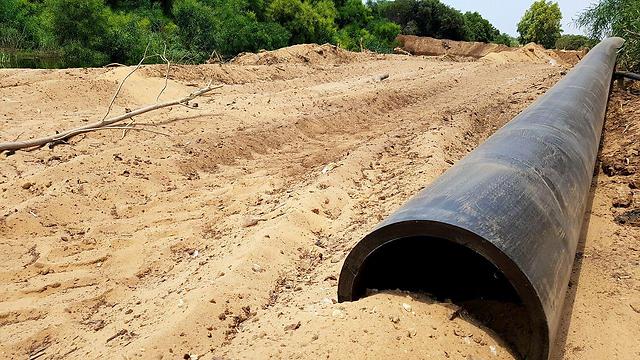
"For instance, parts of Gaza and Israel feed off the same Coastal Aquifer and groundwater. If groundwater are polluted due to the Gaza crisis, Israel stands to lose a very significant resource. While we're not on the verge of peace with Gaza, Israel has to promote joint action on issues we can—and must—cooperate with them," the Israeli official opined.
"The Water Authority is very concerned with the environmental situation in Gaza stemming from lack of proper water and sewage infrastructures and has been doing the utmost to assist with equipment to get the Gaza water sector back on its feet," a statement by Israel's Water Authority said.










